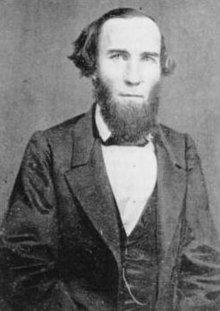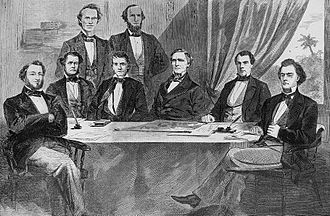| LeRoy Walker | |
|---|---|
 | |
| 1st Confederate States Secretary of War | |
| In office February 25, 1861 – September 16, 1861 | |
| President | Jefferson Davis |
| Preceded by | Position established |
| Succeeded by | Judah Benjamin |
| Personal details | |
| Born | (1817-02-07)February 7, 1817 Huntsville, Alabama, U.S. |
| Died | August 23, 1884(1884-08-23) (aged 67) Huntsville, Alabama, U.S. |
| Political party | Democratic |
| Alma mater | University of Alabama, Tuscaloosa University of Virginia |
| Military service | |
| Allegiance | Confederate States |
| Branch/service | Confederate States Army |
| Years of service | 1861–1862, 1864–1865 |
| Rank | Brigadier general |
| Battles/wars | American Civil War |
LeRoy Pope Walker (February 7, 1817 – August 23, 1884) was the first Confederate States Secretary of War.
Early life and career
Walker was born near Huntsville, Alabama in 1817, the son of John Williams Walker and Matilda Pope, and a grandson of LeRoy Pope. He was educated by private tutors, then attended universities in Alabama and Virginia. Before reaching the age of 21, he was admitted to the bar. He married Eliza Dickson Pickett on July 29, 1850. He held various offices in Alabama; in 1853, he resigned his position as a circuit court judge in order to focus on his legal practice. He actively promoted secession.
Civil War
Largely on the advice of several of Walker's supporters, including his brother Richard, President Jefferson Davis appointed him to the post of Secretary of War, though Walker was not personally known to Davis. He was energetic and confident in support of the Confederacy, but had no military training. The stress and difficulties of his cabinet position seriously affected his health. In March 1861, the Southern states that had seceded from the Union appointed special commissioners to travel to those other Southern states that had yet to secede. Walker was chosen as the commissioner from Alabama to the Tennessee Secession Convention, where he publicly read Alabama's Articles of Secession and tried to persuade Tennessee politicians to vote to do likewise.
In April 1861, shortly after the Civil War began with the bombardment of Fort Sumter by rebel forces, Walker predicted that Washington, D.C., and Boston would fall to the Confederacy before May 1 of that year. However, this never happened.
Starting in August 1861, Davis encouraged Walker to become a Confederate representative to Europe; Walker did not accept this, but on September 16 he resigned his post. Davis made him a brigadier general in the Confederate States Army, and he commanded the army garrisons in Mobile and Montgomery, Alabama, before resigning in March 1862. He returned to the army in April 1864 to serve as a military judge.

Post-war

After the war, Walker returned to his legal practice and continued to be interested in politics. He died in 1884 and was buried in Maple Hill Cemetery in Huntsville.
See also
Notes
- Patrick 1944, p. 105.
- Patrick 1944, pp. 104, 106, 110.
- Patrick 1944, pp. 116–117.
References
- "Leroy Pope Walker". The Confederate War Department. Archived from the original on August 8, 2011. Retrieved August 13, 2011.
- Eicher, John H.; Eicher, David J. (June 2002), Civil War High Commands, Stanford, CA: Stanford University Press (published 2001), ISBN 978-0-8047-3641-1
- Patrick, Rembert W. (1944). Jefferson Davis and His Cabinet. Baton Rouge: Louisiana State University Press. pp. 104–120.
- Sifakis, Stewart (1988), Who Was Who in the Civil War, New York: Facts On File, ISBN 978-0-8160-1055-4
- Warner, Ezra J. (1959), Generals in Gray: Lives of the Confederate Commanders, Baton Rouge, LA: Louisiana State University Press, ISBN 978-0-8071-0823-9
| Political offices | ||
|---|---|---|
| New office | Confederate States Secretary of War 1861 |
Succeeded byJudah Benjamin |
| Cabinet of President Jefferson Davis (1861–1865) | ||
|---|---|---|
| Vice-President |
|  |
| Secretary of State |
| |
| Secretary of the Treasury |
| |
| Secretary of War |
| |
| Secretary of the Navy |
| |
| Postmaster-General |
| |
| Attorney-General |
| |
| Speakers of the Alabama House of Representatives | ||
|---|---|---|
| Alabama Territory |  | |
| State of Alabama |
| |
- 1817 births
- 1884 deaths
- Alabama state court judges
- American Presbyterians
- Confederate States Army brigadier generals
- Executive members of the Cabinet of the Confederate States of America
- 19th-century American legislators
- Democratic Party members of the Alabama House of Representatives
- Politicians from Huntsville, Alabama
- People of Alabama in the American Civil War
- Walker family
- Military personnel from Huntsville, Alabama
- Lawyers from Huntsville, Alabama
- 19th-century American judges
- 19th-century American lawyers
- 19th-century Alabama politicians